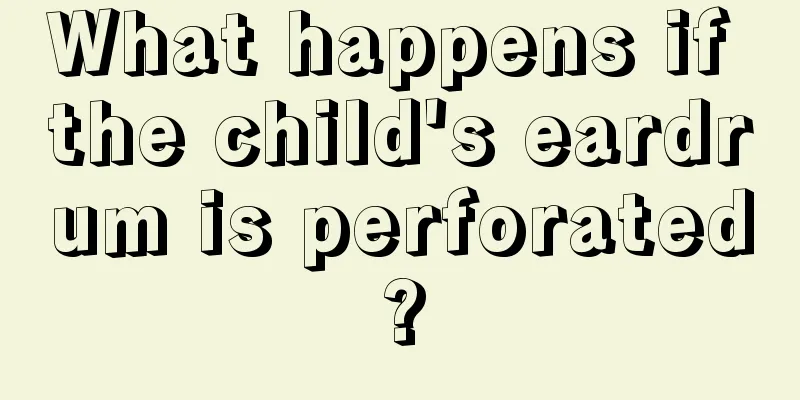What happens if the child's eardrum is perforated?

|
A perforated eardrum is what is called a perforated tympanic membrane. The ears are extremely important to anyone. Moreover, the structure of the ear is extremely complex. Since it has many protective structures, the ear is generally not easily damaged. Tympanic membrane perforation is a more serious condition, often caused by violent injury or inflammation. So what should patients with a perforated eardrum do? There are many reasons that can cause tympanic membrane perforation, which are mainly divided into traumatic tympanic membrane perforation and inflammatory tympanic membrane perforation. The former includes blunt instrument impact, skull base fracture, explosion, acupuncture, burns, etc., while the latter is mainly seen in acute and chronic otitis media. There are three ways to treat a perforated eardrum: (1) If there is pus discharge from the middle ear due to inflammation, anti-inflammatory treatment should be given. In the acute stage, systemic antibiotics should be used, and 2.5% chloramphenicol ear drops or 0.3% ofloxacin ear drops should be used for local ear bathing; (2) If the perforation is caused by trauma and there is no infection, the ear canal can be plugged with sterilized dry cotton balls and antibiotics can be used to prevent infection. Local ear drops are not needed. (3) If the eardrum perforation has not healed after 2-3 months of treatment (1 month for traumatic perforation), a special examination (including otoscopy, hearing, nasal cavity, nasopharynx, and Eustachian tube function examination) is required. If conditions permit, tympanoplasty can be performed to preserve or improve hearing. For patients with long-term uncured otitis media or granulation growth, or marginal perforation in the flaccid or tense part of the tympanic membrane, X-ray film or CT scan should be performed to clarify the scope of the lesion, and surgery should be performed to remove the lesion first to obtain a dry ear, and then tympanoplasty can be performed selectively according to the conditions. Traumatic perforation may heal on its own. If it does not heal after 1-2 months, surgical treatment can still be performed. Tympanic membrane perforation is a relatively serious condition, and improper treatment may seriously affect the patient's hearing. Especially for pediatric patients, more active treatment should be given for the healthy growth of the children. The treatment is mainly aimed at the cause of the disease. Patients with otitis media should receive anti-inflammatory treatment as soon as possible. Those with trauma should actively fight infection and perform tympanic cavity repair at the same time. |
<<: What should I do if my child has gastrointestinal dysfunction?
>>: What should I do if my child can’t hold his urine?
Recommend
What are the effects of neonatal asphyxia?
For a mother, the happiest thing is the moment th...
What to do if your six-month-old baby has a red bottom
Many mothers have encountered the situation of ba...
What are the symptoms of baby teething?
After a baby is born and grows up, there will be ...
What is the cause of white spots on children's fingers?
Babies are the apple of their parents' eyes, ...
What is the reason for the child's
Children are weak, their immune systems are not a...
How to cure dysentery in children the fastest
Nowadays, both adults and children have a higher ...
What happens if your baby takes too much calcium?
There are many people suffering from calcium defi...
What are the treatments for rhinitis in children?
Rhinitis, also known as sinusitis, is very common...
What to do if Kawasaki disease recurs for the second time
Kawasaki disease is a common symptom among childr...
What should I do if my baby has a fever?
It is actually very common for babies to have a f...
Myocarditis in children
Diseases such as myocarditis are a relatively ser...
Respiratory syncytial virus positive
Respiratory syncytial virus mostly occurs in newb...
How many times a day is normal for a baby to have bowel movements
Parents who are feeding their babies often ask a ...
A 5-year-old child has a cold, phlegm, and vomits when eating?
As children grow up, it is common for them to cat...
Consequences of protein deficiency in children
Protein is an important component of all cells an...









